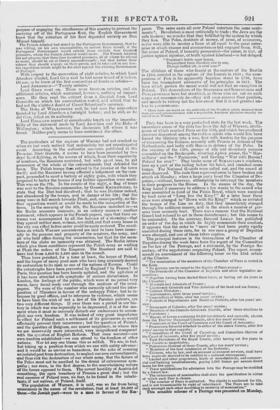The particulars of the capture of Warsaw had not reached
us when we last week noticed that melancholy but not unanticipated event. According to the authentic accounts published in the Prussian State Gazette, it seems to have been preceded by two days' hard fighting, in the course of which, from their superiority of numbers, the Russians contrived, but with great loss, to get possession of the whole of the entrenchments that defended the town. The Polish troops than retired to the interior of the town itself; and the Russians having effected a lodgement on the ram- part, proceeded to erect a battery of eighty guns, with which they proposed to batter the houses if any farther opposition were made. This was on the 7th. In the course of the night, a flag of truce was sent to the Russian commander, by General KRUKOWIEKI, to .state that the Diet had dissolved ; that he was Dictator indeed, but abandoned by the troops, and in danger of his life ; that the army were in full march towards Plozk, and, consequently, no fur- ther opposition would or could be made to the occupation of the town. In'the morning of the 8th, the Russians marched in—as the Berlin accounts insinuate, in an orderly manner : another statement, which appears in the French papers, says that their en- trance was accompanied by all .the horrors of a storming—that they spared neither man, woman, nor child, and that every house in the city was rifled before order could be again. restored. The condi- tions on which Warsaw surrendered are said to have been immu- nity to the persons and property of the senators, the army, and all who held office during the insurrection, but that for the mem- bers of the clubs no immunity was obtained. The Berlin letters which give these conditions represent the Polish army as waiting at Plozk the orders of the Emperor. The Russians are said to have lost from 4,000 to 5,000 men in the assault.
Thus have perished, for a time at least, the hopes of Poland, and the hopes of many good men who have long anxiously desired its restoration to its rank as one of the nations of Europe. Could the catastrophe have been prevented by England ? by France? In Paris, this question has been keenly agitated, and the agitation of it has been attended with symptoms of serious disturbance. In London, the feelings.of the public, which were at no period very warm, have found ready vent through the medium of the news- papers. We were of the number who earnestly advised the inter- position cf Ministers in favour of the unhappy Poles: but to in- terpose by good offices, and to interpose by violence, which seems to have been the wish of not a few of the Parisian patriots, are two very different things. If ever there was a period in our his- tory in which war.was especially to be deprecated, it is at the mo- ment when it must so seriously disturb our endeavours to accom- plish our own freedom. It was indeed of very great importance to effect for Poland such a settlement of its grievances as would effectually prevent their recurrence ; but the question of Poland, and the question of Belgium, our nearer neighbour, in whose fate we are necessarily more interested, were insignificant compared with the question of English Reform. That once secured—our -own freedom establishedwe can attend to the freedom of other nations. Nor let any one blame this as selfish. We are, in fact, but taking up a position from which we can with safety advance: and it would be as unwise as hazardous, for the sake of rescuing an isolated post from destruction, to neglect our own entrenchments. And thus risk the destruction of our whole army. But the failure of the Poles must not be ascribed to the denial of extraneous sym- pathy ; nor even, in the first degree, to the overwhelming nature of the forces opposed to them. , The covert hostility of Austria did something, the open treachery of Prussia a great deal ; but the real enemies of Poland were, wefear, to be found in the inhabi- tants, if not natives, of Poland, itself.
The population of Warsaw, it is said, was so far from being unanimous in the cause of the revolution, that at least 30,000 of them—the Jewish part—were to a man in favour of the Em- poor, The same caste all over Poland entertain the same senti- ments *. Revolution is most-unfriendly to trade ; the Jews are the sole traders ; no wonder that they hold fast by the system by which they live. The Poles, destitute of money, of arms, of resources, never were able to muster a force at all equal to the great enter- prise hi which chance and circumstances had engaged them. Still, the cause of Poland, if honestly prosecuted—the cause, in fact, of justice against injustice, of truth against falsehood—is but delayed.
"Freedom's battle once begun, Bequeathed from bleeding sire to son, Though baffled oft, is ever won !"
The children of those who fought at the capture of the Bastile in 1789, assisted in the capture of the Louvre in 1830 ; the com- panions of Fox in his apparently hopeless stand in 1796, have been the triumphant advocates of his principles in 1831. The laws which govern the moral world will not find an exception in Poland. The descendants of the SOBIESKIS and KOSCIUSKOS and PONIATOWSKIS have but stumbled, as those who set out on such a race not uncommonly do—they will soon recover their position, and.rnarch to victory not the less sweet that it is not granted un- less to perseverance.
* These facts are stated on the authority of the Standard, which obtained them from personal communication with a respectable American physician recently re- turned from Warsaw.


























 Previous page
Previous page